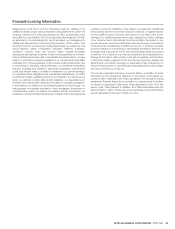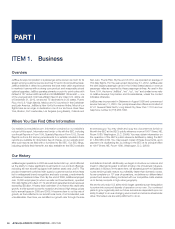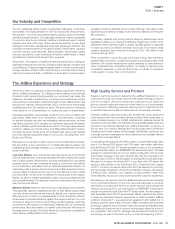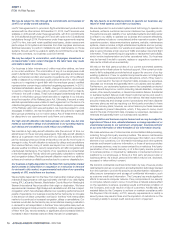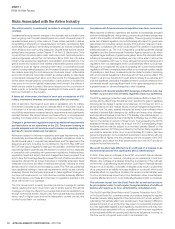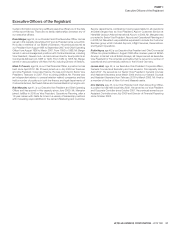JetBlue Airlines 2012 Annual Report Download - page 19
Download and view the complete annual report
Please find page 19 of the 2012 JetBlue Airlines annual report below. You can navigate through the pages in the report by either clicking on the pages listed below, or by using the keyword search tool below to find specific information within the annual report.JETBLUE AIRWAYS CORPORATION-2012 10K 15
PART I
ITEM1ARisk Factors
could have important consequences to investors and could require a
substantial portion of cash fl ows from operations for debt service payments,
thereby reducing the availability of our cash fl ow to fund working capital,
capital expenditures and other general corporate purposes.
Our high level of debt and other fi xed obligations could:
•
impact our ability to obtain additional fi nancing to support capital expansion
plans and for working capital and other purposes on acceptable terms
or at all;
•
divert substantial cash fl ow from our operations and expansion plans in
order to service our fi xed obligations;
•
require us to incur signifi cantly more interest expense than we currently
do if rates were to increase, since approximately 40% of our debt has
fl oating interest rates; and
•
place us at a possible competitive disadvantage compared to less
leveraged competitors and competitors with better access to capital
resources or more favorable terms.
Our ability to make scheduled payments on our debt and other fi xed
obligations will depend on our future operating performance and cash fl ows,
which in turn will depend on prevailing economic and political conditions
and fi nancial, competitive, regulatory, business and other factors, many
of which are beyond our control. We are principally dependent upon
our operating cash fl ows and access to the capital markets to fund our
operations and to make scheduled payments on debt and other fi xed
obligations. We cannot assure you we will be able to generate suffi cient
cash fl ows from our operations or from capital market activities to pay
our debt and other fi xed obligations as they become due; if we fail to do
so our business could be harmed. If we are unable to make payments on
our debt and other fi xed obligations, we could be forced to renegotiate
those obligations or seek to obtain additional equity or other forms of
additional fi nancing.
Our substantial indebtedness may limit our ability to incur additional
debt to obtain future fi nancing needs.
We typically fi nance our aircraft through either secured debt or lease
fi nancing. The impact on fi nancial institutions from the global credit and
liquidity crisis and continuing economic malaise may adversely affect
the availability and cost of credit to JetBlue as well as to prospective
purchasers of our aircraft we undertake to sell in the future, including
fi nancing commitments we have already obtained for purchases of new
aircraft. To the extent we fi nance our activities with additional debt, we
may become subject to fi nancial and other covenants that may restrict
our ability to pursue our strategy or otherwise constrain our operations.
Our maintenance costs will increase as our fl eet ages.
Our maintenance costs will increase as our fl eet ages. In the past, we
have incurred lower maintenance expenses because most of the parts
on our aircraft were under multi-year warranties; these warranties have
for the most part expired. If any existing maintenance provider with whom
we have a long-term “power by the hour” agreement fails to perform or
honor such agreements, we will incur higher interim maintenance costs
until we negotiate new agreements.
Furthermore, as our fl eet ages, we expect our fl eet will require various
modifi cations over the next several years to ensure its continued effi ciency,
modernization, brand consistency and safety. Our plans to equip our
A320 aircraft with sharklets, for example, will, in some cases, require
signifi cant modifi cation time. These fl eet modifi cations will require signifi cant
investment over the several years, including taking aircraft out of service
for several weeks at a time.
Our salaries, wages and benefi ts costs will increase as our workforce ages.
As our employees’ tenure with JetBlue matures, our salaries, wages
and benefi ts costs will increase. Our pilot pay structure, for example, is
based on an industry derived average and to the extent our competitors
continue consolidating and/or begin raising their pilot salaries in the face
of a possible pilot shortage, we may have to address increased salary
cost pressure to retain our pilots in an environment where our capacity
is also forecast to continue to grow. As our work force ages, we expect
our medical and related benefi ts to increase as well, despite an increased
corporate focus on crewmember wellness.
If we fail to successfully implement our strategy, our business could
be harmed.
We have grown, and expect to continue to grow our business whenever
practicable, by modifying the frequency of fl ights to markets we currently
serve, expanding the number of markets we serve and increasing fl ight
connection opportunities. We have modifi ed our rate of growth several
times over the past few years due to higher fuel prices, the competitive
pricing environment and other cost increases, by deferring some of our
scheduled deliveries of new aircraft, selling some used aircraft, terminating
our leases for some of our aircraft, and leasing aircraft to other operators.
A continuation of the economic downturn may cause us to further reduce
our future growth plans from previously announced levels.
To the extent we continue to grow our business, opening new markets
requires us to commit a substantial amount of resources even before the
new services commence. Expansion is also dependent upon our ability to
maintain a safe and secure operation and requires additional personnel,
equipment and facilities. An inability to hire and retain personnel, timely
secure the required equipment and facilities in a cost-effective manner,
effi ciently operate our expanded facilities, or obtain the necessary regulatory
approvals may adversely affect our ability to achieve our growth strategy,
which could harm our business. In addition, our competitors often add
service, reduce their fares and/or offer special promotions following
our entry into a new market. We cannot assure you we will be able to
profi tably expand our existing markets or establish new markets or be
able to adequately temper our growth in a cost effective manner through
additional deferrals or selling or leasing aircraft; if we fail to do so, our
business could be harmed.
There are risks associated with our presence in some of our international
emerging markets, including political or economic instability and failure
to adequately comply with existing legal requirements.
Expansion to new international emerging markets may have risks due to
factors specifi c to those markets. Emerging markets are countries which
have less developed economies and are vulnerable to economic and political
problems, such as signifi cant fl uctuations in gross domestic product, interest
and currency exchange rates, civil disturbances, government instability,
nationalization and expropriation of private assets, traffi cking and the
imposition of taxes or other charges by governments. The occurrence of
any of these events in markets served by us and the resulting instability
may adversely affect our business.
We have expanded and, if market and other conditions warrant it, may
continue to expand our service to countries in the Caribbean and Latin
America, some of which have less developed legal systems, fi nancial
markets, and business and political environments than the United States,
and therefore present greater political, legal, economic and operational
risks.We emphasize legal compliance and have implemented and continue
to implement and refresh policies, procedures and certain ongoing training
of employees with regard to business ethics, anti-corruption policies and
many key legal requirements; however, there can be no assurance our
employees will adhere to our code of business ethics, anti-corruption
policies, other Company policies, or other legal requirements.If we fail
to enforce our policies and procedures properly or maintain adequate
record-keeping and internal accounting practices to accurately record our
transactions, we may be subject to sanctions.In the event we believe or
have reason to believe our employees have or may have violated applicable
laws or regulations, we may be subject to investigation costs, potential
penalties and other related costs which in turn could negatively affect our
reputation, and our results of operations and cash fl ow.


